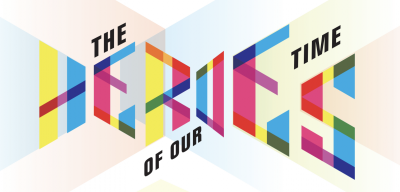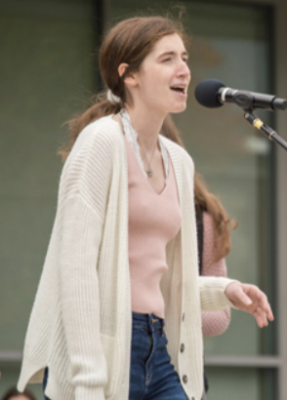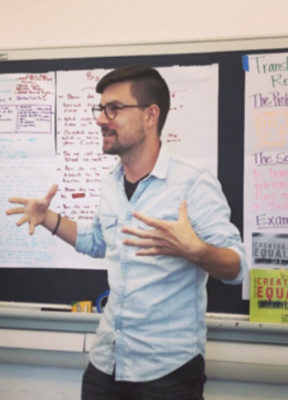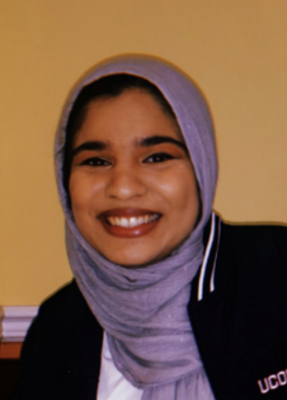
By Brian A. Boecherer
For those of you familiar with the EuroVision Song Contest, you may recognize the title of this new section of the UConn ECE Magazine as a refrain from the 2015 song contest winning song, Heroes. The phrase is used in other modern songs too, and naturally, for those who know Russian literature, it is nearly identical to a famous Mikhail Lermontov novel from 1840 — Hero of our Time. We are using this as a title to highlight members of the UConn ECE community who help promote social well-being, social cohesion, and improve the lives of others. They are everyday heroes who engage in current issues of our times — they are members of the UConn ECE community who provide leadership in the form of education, the arts, activism, and more. Their energy and interactions change lives in a personal way and offer us examples of how our engagement helps others, as well as ourselves.
UConn ECE Alumnus 2016-2017, Glastonbury High School
Singer, Mentor, Community Leader
"Think about what your own interests and passions are. Do what you want to do, not what others want you to do. Don’t worry about achieving leadership experience, that will come if you do what you love. If you are doing what you are passionate about, you will want to be a leader."
Jacob Skrzypiec
UConn ECE Instructor in Human Rights
Educator, Activist, Thought Leader
"We need to prepare students to be civically engaged, decent, educated, and paying attention. This is a response to the current political climate...We need students to practice human rights in the classroom and in their lives."
Fizza Alam
UConn ECE Alumnus 2016-2017, Waterbury Career Academy
Proactivist, Thinker, Optimist, Community Educator
"Because of the pandemic, we all have the opportunity to stay inside our house and look outwards. This is true about our own person too. There are so many communities that are hurting. I want people to have a little bit of sympathy. Take away your own personal interests for a second and see if you can consider someone else’s and help them. Don’t do it because you want..."


Jane Yalof
UConn ECE Alumnus 2016-2017, Glastonbury High School
Singer, Mentor, Community Leader
Young people need to understand that good leaders come with a host of other positive characteristics – humility, an adventurous spirit, and the ability to cultivate communities. Jane Yalof is such a leader, and her story is as impressive for a young adult as it is for a seasoned professional. Jane is active in a diverse array of activities at the University of Connecticut and is a leader in all of them. As she told me, she did not set out to be a leader, “it just sort-of happened”. And lead she does. Over her time at UConn, Jane has been active mentoring students, teaching mentoring to students, and continues to enliven female students as Music Director and singer in the all-female acapella group, Drop the Bass.
Jane is a UConn student who will be graduating Spring 2022 with a combined undergraduate and master’s degree in the Neag School of Education. She is light-hearted, bright, and has an optimism in society that has come from her deep engagement with it. Over the last five years she has seen how one person’s engagement can positively affect others. That’s how she started her activity as a mentor, by being mentored. Since then she has been actively involved as a mentor and teaching assistant through First Year Programs and through her involvement in Community Outreach. Jane engages in these community-oriented activities because her actions help others and teach others to help society in their own personal way. At the end of our hour-long conversation it is clear to me that Jane counts her successes in terms of the communities she fosters, the relationships she makes, and the tough conversations she helps other students have as a facilitator. It is impact on a personal level that counts. “[As a mentor and teaching assistant] we really created a safe space and helped students through tough issues. Many times, just by listening, and often by sharing our own personal stories. It is about learning to care for each other and protect each other.” Giving yourself to create a community makes you vulnerable, but it tends to make the community strong. Jane gives her time freely and extensively to help lead and educate others on the power of themselves.
In addition to her extensive mentoring and community outreach, which has also led her to a local elementary school as a tutor and to Alabama to engage on issues of racial injustice, Jane spends a great deal of time in the all-girl acapella group, Drop the Bass, where she serves as the Music Director and Vice President. “Do you get the name?” she asks me. “Drop the Bass – we are an all-girls singing group. ‘We don’t need no man’,” she says, with a joking lilt. This engagement, however, has become more than a creative outlet – it has become a community of young women who are interested in supporting young women and understand their layered identities, their power, and their impact on others. It is a community that works together to express important messages. As Music Director, Jane teaches music, runs rehearsals, supports others for voice parts, finds music to arrange (or arranges it herself) so the group of 16 young women can vote on what they will practice and perform for the community. “It is very girl-empowering, with a deep impact. It is about the singing, it is about enjoying what you are doing. It is about service too.” Their genre is female power ballads – “Cosmic Love”, by Florence + the Machine, and “The Village”, by Wrabel, (a gender power ballad) about a person who is transgender and their parents do not accept them yet. “The song is about there being nothing wrong with you. Rather, there is something wrong with them if they cannot come to you and ‘get’ you.” They are currently working on, “Don’t Worry About Me”, by Frances, which is dedicated to families and friends of those who lost their loved ones to COVID. It has not been easy working together during COVID, because they are working together at a distance, using Zoom. But they are recording their parts and working with another UConn student to synchronize it and make a video.

Jacob Skrzypiec
UConn ECE Instructor in Human Rights
Educator, Activist, Thought Leader
Talking with Jake about human rights and about making society kinder, smarter, and less polarized is anything but depressive. During the course of my interview, Jake makes me feel like I am the single most important person for making change happen. He is right, change starts with our everyday interactions with others. But indeed, in a climate where some politics has turned populist and daily human rights can be fragile, his words have a touch that unlock optimism and encourage a “benefit of the doubt” to others. What are we personally doing to make things better? Jake suggests that we should focus on what we can affect, make it better, and then reach a little bit further.
Jake (MA, UConn Neag School of Education, 2014) is a UConn ECE Human Rights instructor at Manchester High School (certified 2015) and is one of the founding figures in helping to develop a UConn ECE Human Rights program. Manchester High School (MHS) is unique in its vision of human rights as in June 2015, MHS made human rights a required course for graduation. Every student in Manchester has to take human rights, and with their five certified UConn ECE human rights instructors, most students are leaving the high school learning the “for and through” of human rights, but also walking away with UConn credit.
Jake mentions the for and through of human rights throughout our conversation. A brief explanation for us newbies: The Council of Europe succinctly explains that education is a right, but also a way for realizing rights, and we “put our rights and democracy into practice, and defend our rights and those of other people, if they are not respected – LEARN FOR THEM. Experience and feel the principles of human rights and democracy — LEARN THROUGH THEM.”
“How do we move kids and adults to think about the for and through? By practicing human rights in the classroom and in their lives.” For the last five years Jake has engaged in tempestuous issues with students to model and teach civility and open dialogue. Among other things, Jake teaches listening to others, even when you disagree, so that you may learn about what motivates others.
An important pivot point for Jake happened about three years ago. In his UConn human rights course, he had two students debating about transgender rights — both on opposing sides. The conversation got heated and turned into what he called a “bickering match”. Jake had to separate the students and administration got involved. Jake has reflected on that moment and says, “That anger, deep fear, and the unknown of someone else’s perspective struck me. Students are still developing and trying to learn, often as they speak.” But it struck him as being emblematic of society. “It is important to focus on the skills of communication, academic discourse, basic patience, and humility with our students so that they can be good adults.”
In addition to his work in the classroom, which includes teaching human rights at UConn in the summer for University of Connecticut’s College Access and Preparation Program (UCAP), Jake has been at the forefront of bringing human rights to social studies curriculum throughout the State and on the national level. It started when MHS gave him and his colleagues the latitude and encouragement to develop a human rights program for the school. But to do that well, Jake reached out to the Thomas J. Dodd Research Center and the Connecticut Human Right Partnership — bringing organizations and individuals together for human rights advocacy. From there he helped to build the Human Rights Summit, which is a human rights workshop day for teachers, students, and the community. Then Jake, along with fellow UConn ECE human rights instructor, Chris Buckley (Brookfield High School), became the regional representatives for Human Rights Educators USA, to advance human rights education, advocacy, and opportunities on the national level. “It is a diverse organization, a powerful group,” Jake says bluntly and with pride.
Jake is also part of the leadership group in The National Council for the Social Studies, Human Rights Education Community, which works to promote human rights as an academic concentration in the high schools, and develop a new C3 social studies standard in human rights. “Four years ago [they] were more hesitant to embrace human rights education in K-12, but today that dynamic has completely changed. There is now a thirst for this curriculum to embed human rights into national social studies standards. There has been a cultural shift here.”
Circling back to the beginning, how does Jake stay positive and how does he help his students from turning morose in the face of historical and current atrocities?
“It’s hard; it’s not an easy task. We might be looking at a human rights violation — voting rights for example — and look at the history of suppression. We have to acknowledge there are screwed up things going on, but we also have to look at the positive work that is going on. Let’s focus on the accomplishments and the tools to make things better. It is important to give students tools to work at resolving issues.” It is also about self-care. Since COVID hit, Jake has been on over 70 hikes, not to lose himself or his connection with family and friends. “There still is positivity in the world. We need to focus on that too,” he says. He also invests time into writing. His recent article entitled, “A Ripple of Hope,” Media Voices for Children, Vol. III, explores how students are often more hopeful and ready to get involved than adults. “We need to build on youth voice. Support it, cultivate it. The kids get it,” he says with a smile in his voice. “Going to class every day, I love it, I can see hope in students’ eyes. They are engaged and excited about it. This is good stuff. We have to bring out that hope and optimism. That’s our job.”
 Fizza Alam
Fizza Alam
UConn ECE Alumnus 2016-2017, Waterbury Career Academy
Proactivist, Thinker, Optimist, Community Educator
...to feel better about yourself. ...That’s fine too... But there are people out there — our neighbors — who are cold, hungry, and in need. Be empathic about one thing and try to make local action. See how you can help one person and execute it to the end. I don’t know all the ways, but people are innovative – donate clothes, start a community garden in a food desert, mentor... If everyone did one thing, all the problems wouldn’t go away, but we would know that we live in a caring society. We can be in a better place together. These things are so simple I sometimes don’t feel like I can put it into words.”
Fizza says many times during our 90-minute conversation, “I am just like everyone else.” By the end of the interview her insistence that we all share the same characteristics of a generous spirit and care of others leaves me wondering about the different stages of how environment influences conceptual schema — thoughts progress to words and words to actions. In other words, how do we stand up and take action in what we believe. Fizza says that she is a product of good luck — good parents, good mentors, and environmental inequality. The combination has given her insights into how neighbors live side by side — how they help each other and what may happen if they don’t.
Fizza was born in Pakistan, from a family that was forced to migrate due to the partition of India in 1947, and migrate again in 2001 because of societal dangers. When she was a year and a half old, her family immigrated to the United States — Waterbury, Connecticut. She enjoyed growing up in Waterbury, where “neighbor helps neighbor,” but it wasn’t until she was in the tenth grade that she realized that her majority-minority city “had serious issues”. She was recommended and was accepted to attend the Global Leadership Institute at Taft School in Watertown, Connecticut, just one town over. “I went into this gorgeous building, and the dining hall was filled with nutritious foods, the teachers had advanced degrees, and everything was totally different. I saw the differences.” Fizza saw the inequality and realized that access to opportunity — access itself — was what made the difference in a person’s life. “I don’t think kids should be put at a disadvantage because of where they grow up. Kids have aspirations and need access.”
Growing up, Fizza says, her parents were like her friends’ parents — they worked multiple jobs, sometimes 14-hour days — and Fizza, like her peers, would go home after school, take care of siblings and help around the home doing laundry and making food. She enjoys the diversity of Waterbury, although she admits that not everyone is welcoming of Muslims. She says it is because they don’t really know the culture. She recalled a situation that happened to her in kindergarten, when she was five, and had henna on her hands for Eid. “My teacher took me by the hands to wash them, forcibly, with soap and scolded me for “dirtying” them with marker. I couldn’t understand why and felt wrong.” It wasn’t until later that she realized it was a lack of education.
Since then she has made education and educational campaigns a central part of her approach to making change happen. In 2019 Fizza earned a summer internship with Congresswoman Jahana Hayes, where she worked directly with the congresswoman in Waterbury. As a capstone project, Fizza organized a panel on immigration at Naugatuck Valley Community College. “Congresswoman Hayes really gives women of color an opportunity and a voice.” Fizza told me that Congresswoman Hayes bought a select number of tickets for her interns to join a fundraising dinner so they could see what that “other world” looks like and sit at the table with leaders like Nancy Pelosi.
“I have had such great mentors in life. I rolled the dice and got really lucky. If I didn’t meet these people, I would have been very different. So, I am grateful for all that I have. It is luck. Really good luck.” It has also been really good effort.
Fizza has continued her education and awareness campaigns with a large voter registration effort in partnership with Be (A)Part, a non-profit that supports youth involvement, engagement, and activism. Fizza has been working on advancing the issue of absentee voting since 2018, when she was also working on the Hayes election campaign. She sees absentee voting as an issue of access. “We need to expand the vote, because the elderly and low income [people] need greater access.” Be (A)Part reached out to her as she had positioned herself as the youth expert in absentee voting. She says she brought the perspective of an urban woman of color and could speak to how people were being left out because of where they lived and how they lived. As part of the campaign, Fizza was part of a voter outreach and suppression panel. “I love how you can take an idea and then do something with it.”As Fizza is slated to graduate this spring with a double major in political science and economics, she is making plans for her next steps. “I want to make an impact on my community. God willing, I will attend law school next fall. I am an American, and an immigrant, and a woman.” I am not sure where I want to go with that, but I am interested in the impact of law on war and on inequality. Many things go back to laws.” Fizza tells me more about the Sharia and how it is counter to most people’s modern perception of it. She explains how the Prophet, who she modifies with “upon him be peace,” explained that war takes things away from people – possessions, symbols, churches, meaning, people, concepts – and that there should be restrictions on how war is conducted. “I want society to better understand these concepts and expand them.”
Fizza’s philosophies are instructive and they help give perspective on how we can build a better society in our local community. She sees education as offering people access to see how things work and gives them the tools to help themselves and others. She credits her parents and her faith with these perspectives.
“I want to make an impact and help people. For example, the attorney general impacts our lives in so many ways that we never see. You need an education to figure out these things. If I make it through law school, I will be able to understand a new world and bring it back to my community. [Slight pause] I am here, and I don’t know when the next person like me will be in this situation, so I need to do it. When you focus on helping one person or one community, you can stay motivated and stay focused. I hope everyone can feel this way. Learn, and bring it back to your community. I don’t understand how this is a controversial way of thinking.”